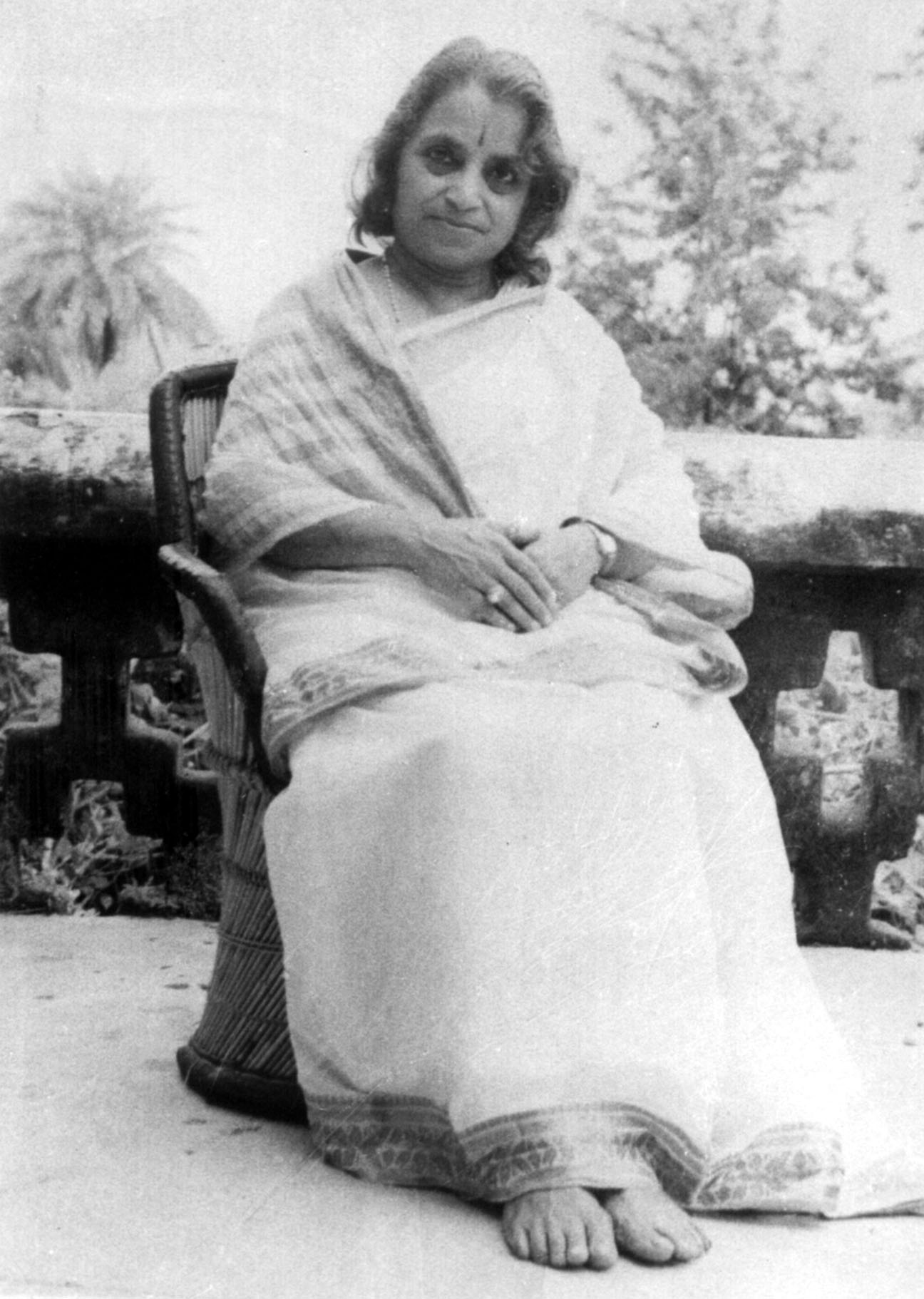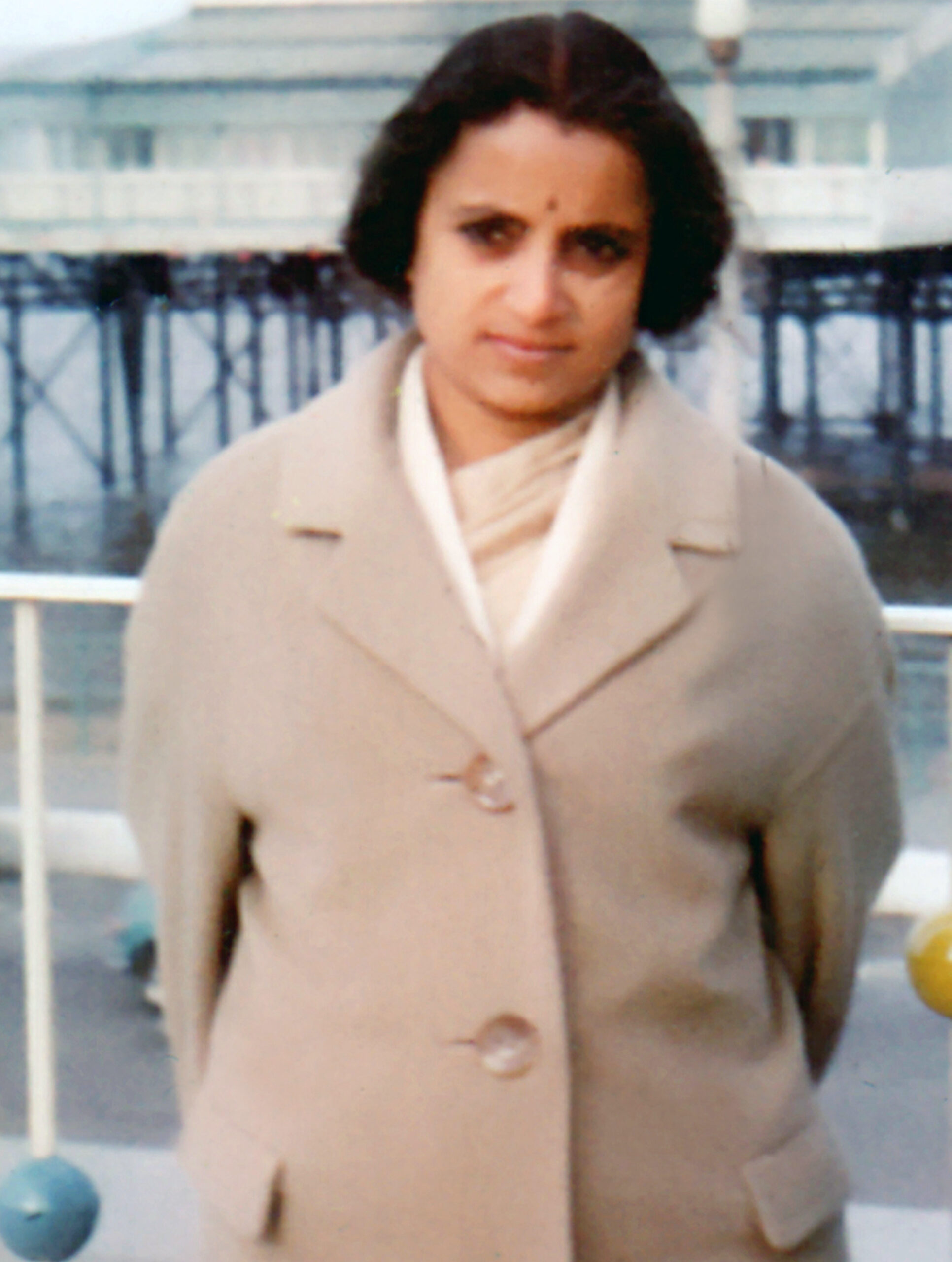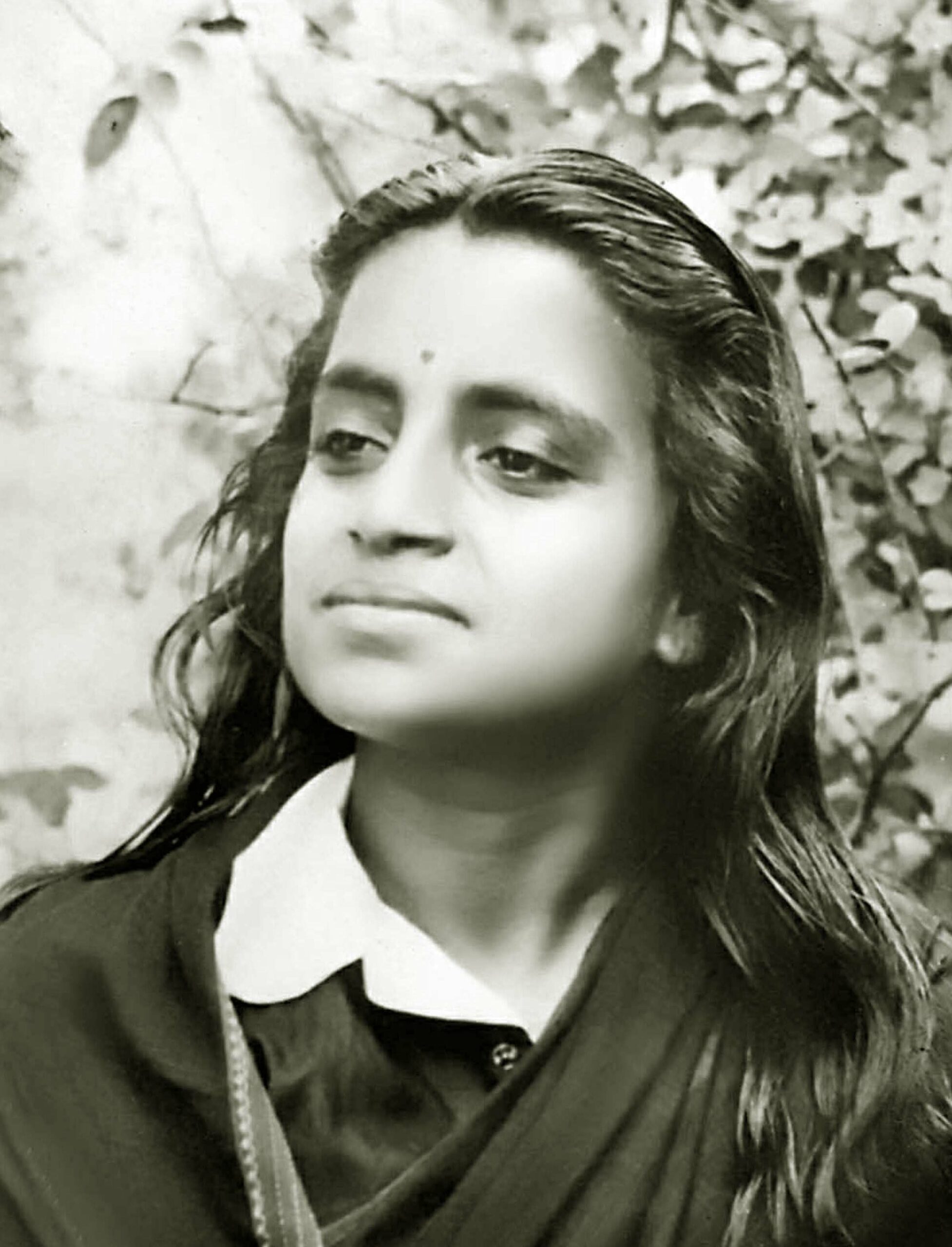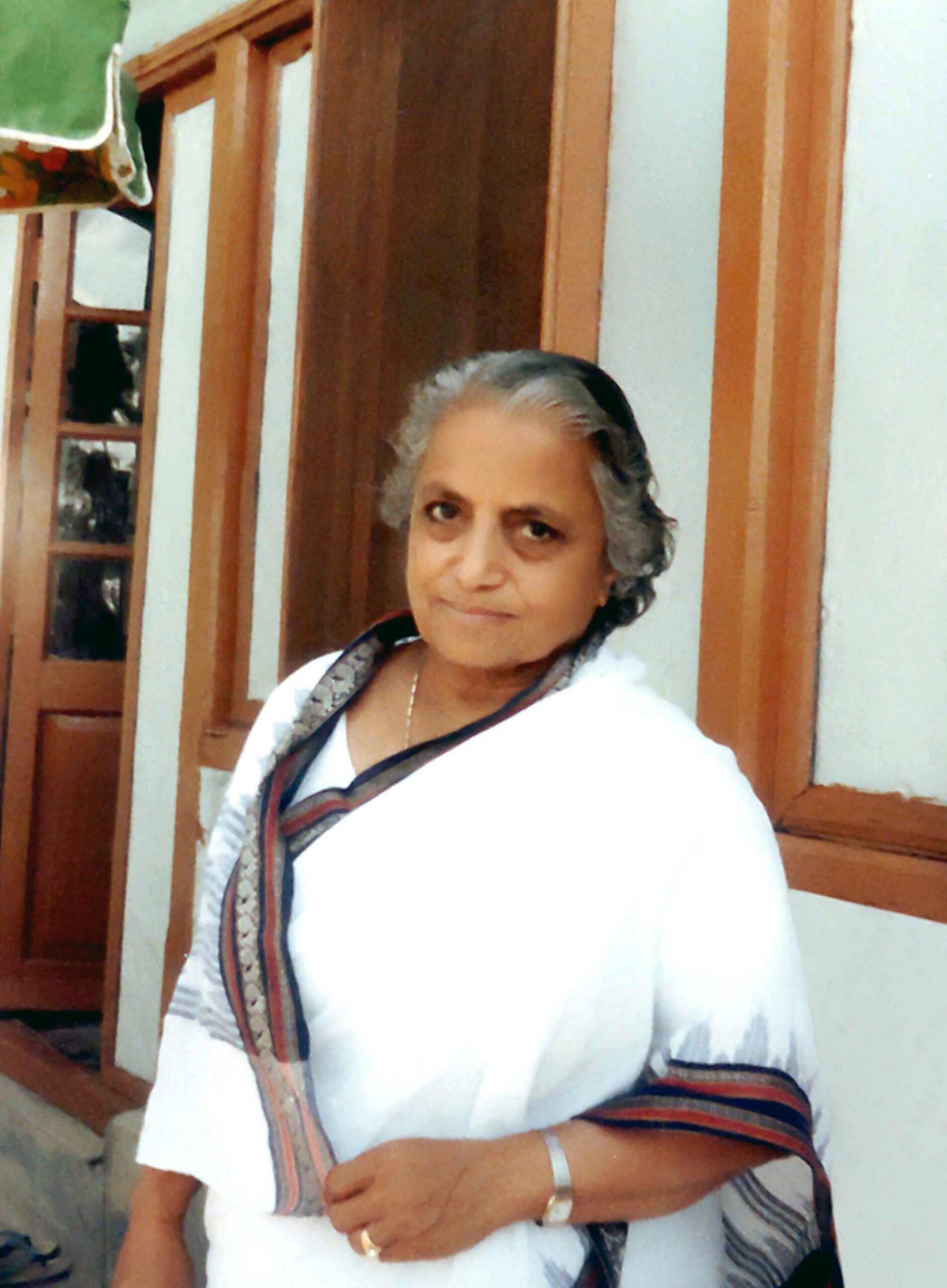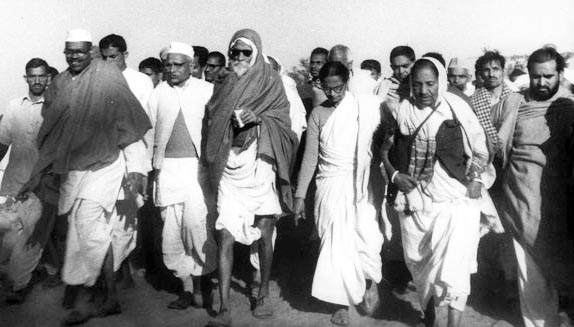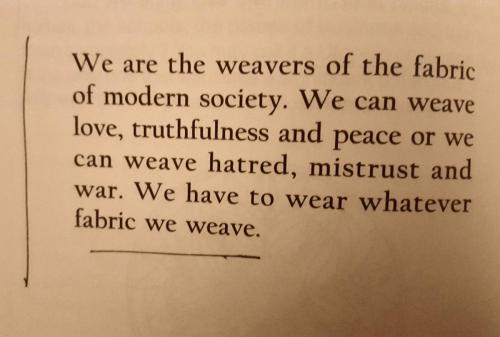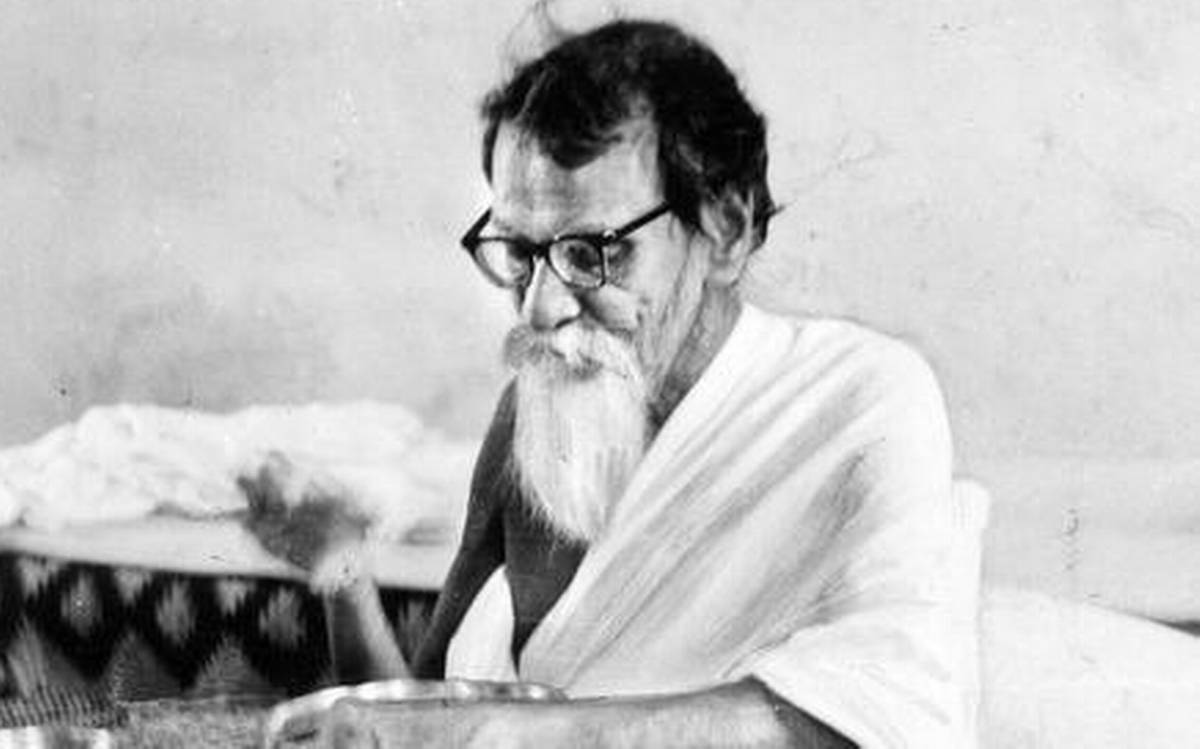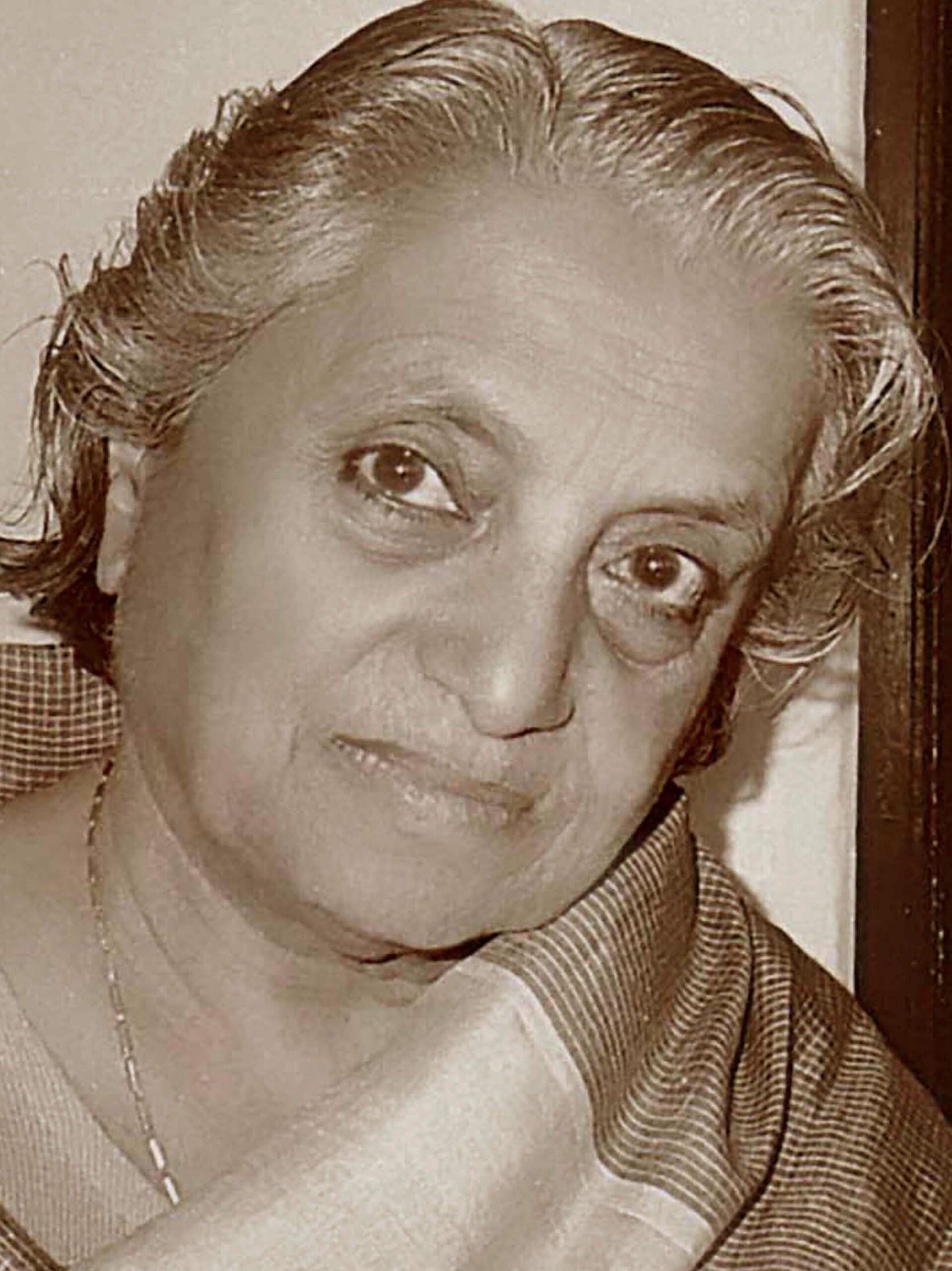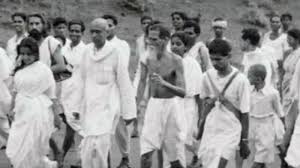When awareness of the totality, of wholeness, dawns upon the heart, and there is awareness of the relationship of every being to every other, then there is no longer any possibility of taking an exclusive approach to a fragment and getting stuck there. As soon as there is awareness of wholeness, every moment becomes sacred, every movement is sacred. The sense of oneness is no longer an intellectual connection. We will in all our actions be whole, total, natural, without effort. Every action or nonaction will have the perfume of wholeness.
Vimala Thakar
Introduction to Vimala Thakar (1921 – 2009)
Written by Jenny Fadranski
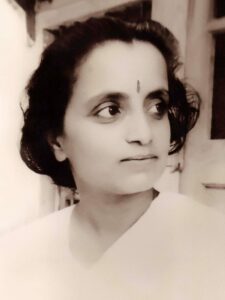 Vimala Thakar, a philosopher, social activist and mystic, and a very independent Indian woman sensed the new potential of human coexistence by turning inwards to explore the inner life.
Vimala Thakar, a philosopher, social activist and mystic, and a very independent Indian woman sensed the new potential of human coexistence by turning inwards to explore the inner life.
She went against the social Indian norms in the middle of the 20th century. Even though women were not allowed to read religious texts, she studied the Indian Vedas and Upanishads, and learned Sanskrit. She struggled passionately to find her own linguistic expression that would convey and communicate her heart‘s desire for inner and outer peace. The film director takes us on an explorative journey where we first meet Vimala Thakar as a young woman.
Unimpressed by several marriage proposals, she joined Vinoba Bhave‘s peaceful land reform movement in India and along with hundreds of fellow campaigners she walked all across India by foot, convincing rich landowners to give a part of their land to poor farmers, so they could build up their own independent existence. The Vinoba movement was, and still is, one of the few non-vio- lent revolutions worldwide in which people gave away land for purely humane and heartfelt reasons, without being forced to do so by a powerful authority.
Vimala Thakar had to end her commitment with the movement due to a car accident. Her subsequent meeting with the philosopher and author Jiddu Krishanmurti changed her life radically, and she finally realized what had become clear for her over the years: That only the inner work and a transformation of one’s own consciousness will counteract the violence and aggression in oneself and in the world. She decided to dedicate her life to following the inner path and was soon invited to Europe, South America and India, where she began to give lectures and seminars on inner transformation.
For over 30 years she travelled throughout India and the world, met thousands of people, and led hundreds of social worker camps in India. During Vimala‘s lifetime,
92 books were published about her work in English, 29 books in Marathi, 123 books in Gujarati and 47 books in Hindi and translated into other European languages. This illustrates the spread of her influence in Asia, Europe and America. Nevertheless, she was very shy, and not liking fame or media presence, she remained relatively unknown despite the volume of her work and activities.
As we are faced with the great challenges of the 21st century, Vimala asks us that our lives should be the expression of a new dynamic of human relationships, a new culture based on inner stillness. In view of a growing sense of meaninglessness in the globalized and technologized world that we have created, she encourages us to find strength in silence and contemplation. And now that civilization is facing serious challenges, we are called to create and shape new forms of co-existence between people and nature.
Vimala Thakar: Spiritual Revolutionary
(15 April 1921 – 11 March 2009)
A personal tribute by Chris Parish (wirtten 2009)
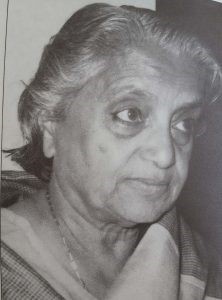
Chances are that you won’t have read anything regarding her passing away, since it wasn’t reported in the Western media. There were a few sparse details in Indian newspapers, but they conveyed little of the significance of the life of Vimala Thakar, who died at her home in India, this March, in Mt Abu, a small town perched atop a mountain rising out of the desert of Rajasthan. For those who had the privilege of meeting her, it is a whole other story. When I think about the great liberated men and women who I have had the good fortune to meet, and I’ve gone out of my way for several decades to seek out such rare individuals, one of the first to spring to mind is always Vimala Thakar. No one who met her could fail to be moved.
For she was a great spiritually enlightened revolutionary and activist; a notable Indian figure of the 20th Century who boldly forged a radically independent approach to spirituality and the search for truth. Freed from all religious tradition, she brought the timeless wisdom of the East to the modern egalitarian West without the baggage of religious terminology, endeavoring to awaken people through deep rational inquiry. Fiercely independent, beholden only to her own burning passion for liberation, she crisscrossed the world for many years, travelling to 35 countries through the sixties, seventies and eighties, exhorting all who would listen to wake up to what she would term the ‘totality of Life.’
Her unusual spiritual passion began early. “The awareness of something beyond dawned on me at the age of five,” she wrote, and at that age she even ran away from home to the forest searching for God. Vimala knew her life would be dedicated to liberation, and her spiritual interest was encouraged by her free-thinking father. Her early life reads like an epic Indian tale. She spent a year meditating in a cave at the age of nineteen; she experimented with spiritual practices, visited ashrams, and also was invariably turned away by the Hindu authorities wherever she went, for the one simple reason that she was a woman. It’s hard to even imagine how bold and revolutionary she must have been as a woman seeker after truth in the deeply traditional India of the 1930’s and 40’s. And yet she was completely undaunted in spite of being hurt fairly often.
As a young woman she became a leading figure in the Gandhian inspired land redistribution movement of Vinoba Bhave, travelling tirelessly throughout India from village to village, lecturing and exhorting wealthy land owners to give land to desperately poor and landless farm workers.
An invitation in 1956 to hear several discourses by legendary Indian spiritual teacher J Krishnamurti was a pivotal point in her life. Listening to him and then later meeting him, precipitated an explosion and irrevocable transformation in the depths of her being, leaving her feeling consumed by an uncontrollable awareness and an intense flame of passion. Krishnamurti, recognizing her liberation, begged her to go out and speak widely, which is something that as far as I know, he never urged anyone else to do, in the full half century of his teaching career.
He said,”Why don’t you explode? Why don’t you put bombs under all these old people who follow the wrong line? Go – shout from the house tops! Go out and set them on fire! There is none who is doing this. Not even one…What are you waiting for?”
So she gave up the social activism of the Land Gift movement to travel the world as an independent spiritual teacher, giving talks and holding meditation and inquiry camps.
In an open letter to her former colleagues she wrote,
“My association with the movement is over…. No more peace and contentment. But a profound human revolution. A human revolution which consists of freeing oneself from every kind of personal, national, racial and ideological preoccupation… Everything that has been transmitted to our mind through centuries will have to be completely discarded.”
And she certainly did teach worldwide. She went wherever she was invited, travelling for decades throughout Europe, the Americas, and India until 1991, when she decided to remain in India. Her many books were published in a dozen languages.
Vimala was so independent minded that she didn’t really see herself as a student of Krishnamurti, and in her turn, she viewed the many people associated with her as friends, saying that the student and teacher must meet as friends. Unsurprisingly, she forged her own approach and although critical of the dogma of religions, nevertheless recommended that a serious seeker should spend at least 3-4 hours a day in spiritual practice and meditation, unlike Krishnamurti, who was always highly critical of engaging in any formal spiritual practice.
Significantly, in yet another chapter in her life, she also re-embraced activism in 1979, working for social justice, environmental sustainability and aiding the poor and disenfranchised. In her own holistic approach to activism she was again ahead of her time in recognizing the need for a real integration of social action and spirituality at a deep innovative level. She saw inner freedom as a social responsibility and just couldn’t relate to seeing one’s inner life as a private matter. Total revolution, inner and outer, was her call. And her life.
“There is infinitely more to life, and each passionate being who dares to explore beyond the fragmentary and superficial into the mystery of totality helps all humanity perceive what it is to be fully human. Revolution, total revolution, implies experimenting with the impossible. And when an individual takes a step in the direction of the new, the whole human race travels through that individual.”
I will never forget my first personal meeting with this remarkable woman in India in 1996, when I went to interview her for a magazine. She had no interest in publicity, nor being photographed or interviewed, which is one major reason she is not more widely known, and she only reluctantly agreed to my request to interview her. Yet she always made herself available for the many seekers, whole groups, and dignitaries from around the world who found the way to her door. By the time I visited her Mt Abu home, she was already elderly, a small dignified Indian lady dressed simply in a crisp white sari. I was stunned by how utterly present and attentive she was, without a single flutter in her being, radiating the mysterious presence and stillness of eternity. Her eyes were large, soft and warm and she was at once unfathomably strong and fearless; you felt as if you actually could see in her how the human and the absolute dimensions were really not separate. Vimala was disarmingly natural, delightful, her being fragrant with the hallmarks of a liberated soul. When she stood up, I was surprised how tiny she was, for she emanated such authority and power. How did she see herself, I asked her?
“I am a simple person, a human being who has loved life and who has seen life as divinity itself. I have lived in love with life, madly in love with the human expression of life as divinity”
In her presence I felt I could see for the first time what a liberated woman is actually like. I’ve never forgotten that unequivocal impression. For she was not a mother figure, not one of the classic Indian woman saints who teach as the Divine Mother. Vimala was an emancipated woman.
When the spiritual history of the world is ever written, from the vantage point of the future, she certainly deserves an entry as a pioneer in translating and transmitting the wisdom of the East to the West in plain non-esoteric language. Krishnamurti is much more celebrated for a similar role, but his female counterpart would have to be Vimala Thakar. She would also be remembered for seamlessly integrating the usually divergent streams of inner awakening and social activism in a way that leaves us all an example to follow.
With her death, a great soul has passed away.
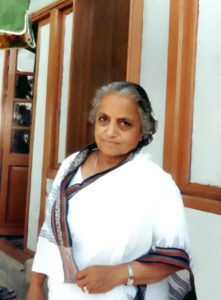 The Challenge of Emptiness –
The Challenge of Emptiness –
Vimala Thakar on the Spiritual Emancipation of Women
an interview by Mary Adams (edited from the original meeting in 1996)
Mary Adams: Namaste, Vimalaji. This morning I would like to talk with you about women in relationship to spiritual liberation.
In the course of the last ten years I have been part of a community of men and women attempting to live together, applying what we have learned through being with our teacher, practicing, and studying his teaching. Initially, those who joined this community did not attach any specific importance to being either male or female. Speaking for myself, I was never drawn to women’s movements. I was just interested in the truth. I’m not a feminist, and I’m not an antifeminist either. I have no doubt that real freedom transcends nationality, transcends religious bias, and also transcends gender.
In our community, at first there didn’t seem to be any particular differences between male and female conditioning, when it came to spiritual practice, to liberation. But over time, deep differences between male and female conditioning have emerged. And this doesn’t seem to be just an individual matter; each sex as a group seems to have its own distinct conditioned patterns.
Let me give you an example. Trying to live these teachings requires developing an ability to observe one’s conditioned habits and tendencies clearly – objectively –in order to actually transcend them, to be free of them. Something that is beginning to emerge is that women often seem to have difficulty with that kind of objectivity. For example, when a conditioned tendency, or negative habit, is revealed, we [women] often take this more personally, and in some cases, will be quite defensive. We tend to feel hurt, and seem to experience more difficulty than the men [in our community] to not be distracted by our emotional responses to what has been ‘seen’. On the other hand, the men don’t seem to get as distracted by their fear, or their pride. They appear to be more interested in finding out, in looking objectively at whatever it is, that they might be facing. The tendency to take things personally, and therefore to defend ourselves, seems to be something that the women, in particular, are coming up against.
Vimala Thakar: The objectification of the inner psychological life is extremely difficult for women. Woman has had a role to play in human history. She has been the wife, the mother, the sister, protected by others, especially by men. In India, the Hindu religion says woman is always to be protected—in childhood by the father, in young age by the husband, and in old age by her son. It is said that she does not deserve freedom. That is the basic principle. And I feel that perhaps in other countries also, she has had only one role to play. It is a secondary role, protected by the male, she did not require objectivity. As a subjective person, she always has to react. Man has to act, man has to earn; woman has to take care. In this secondary role, she never lived for herself as a human being. She lived for the parents, for the husband, for the children, for the family. The family institution has survived at the cost of woman. So the inner freedom of objectifying her own emotions, or perceiving the situation entirely objectively, is very difficult for women, very difficult. Man finds it easier, objectification. But it is very difficult for men to transcend their egos. Woman, through emotional strength and emotional integrity, can go beyond the ego more easily than man. Man can objectify more quickly than woman. There are certain limitations [for both] because of the roles that men and women have played in human history and civilization. When threatened, woman immediately withdraws into her own shell to protect herself, her emotions, her reactions, everything.
MA: Yes, I recognize that.
VT: In India women have been prescribed the yoga of devotion, bhakti yoga. In identifying with a god, a goddess, an idol, or a guru, all the emotional strength and vitality is consumed, so this doesn’t trouble her in other human relationships. But that is not so all over the world. And in many places, man and woman live together. This rarely happens in India. Even in ashrams in India men and women live separately. They come together only for prayers and for meditation, in the presence of the teacher. But visiting each others’ rooms and discussingthings, enquiring together—the kind of thing that takes place in other countries—has not yet come to India. So in India, we may not have the problem you describe. In your situation, men and women are on an equal footing. They are trying to understand the teachings and live them together. To do this, they will inevitably experience the different conditionings of man and woman, that are not consciously adopted, but are inherited.
It is so true, when you say that women withdraw into psychological isolation very easily.
Women feel that they can protect their feelings and observations that way. And that’s a
defect; because that withdrawal, that retiring, or retreating into her shell, prevents woman
from assimilating the essence of the teachings. Women have to accept the world, they have to
accept whatever happens in their interactions, and be there.
MA: Yes.
VT: Women will have to face attachment also. Without the context of the family, when men
and women live together, the biological phenomena of attraction and repulsion is active. You
cannot ignore or deny it. So that attraction or repulsion gets expressed in relationship. Likeminded
people may come together and share the same higher quest, but in the end, we are
human animals. That animality is present, the instinctive impulses are still there. This has to
be transcended through meditation, but the duality inherent in sex is present. Both women
and men have to go through this phenomenon of recognizing and understanding the attraction
and the repulsion, even infatuation, that naturally exists; not lose themselves in it, but go
beyond it. Unless you recognize it, you cannot go beyond it. So without feeling guilty,
without making a fuss about it, without calling it a sin or a crime, one has to see it as it is.
MA: Precisely, yes. That’s very clear. Yet ‘seeing things as they are’, I think, is the challenge
for women who are really serious about this.
VT: For both. [men and women]
MA: For both, exactly.
It’s interesting, Vimalaji, what you are saying about something being “inherited” just by
virtue of women being “protected”. I’ve been thinking about this a lot. In the West, although
this is changing, the basic fact still exists that women are the weaker sex. And there is always
this fear of vulnerability, of exploitation. I wonder whether an inability to trust, in the biggest
sense of the word, has come from this? By trust, I mean here, a fundamental trust in Life, an
ability to actually let go in order to be able to see things clearly for what they are, and not
instinctively defend.
VT: Yes, besides the psychological inheritance look at the biological factor. In the sexual
relationship woman receives and man asserts. This cannot change. This biological factor in
the sex life leaves its imprint on the psychology. The residue of sexual relationship builds up
the male psychology and the female psychology, unless one educates oneself in transcending
the sex consciousness, and the “I” consciousness – the ego, which go together. As long as the
“I” consciousness is at the center, you cannot escape the sex consciousness, the duality. That
duality cannot be negated. It cannot be rejected or ignored; it is there.
So besides the psychology of being protected, the receptive role of the woman has also been a
handicap to her, and she has to go beyond it. And man has to go beyond that assertive
psychology. For what is true in the physical and the biological realm, he extends to the
psychological. There is a kind of assertiveness and [tendency toward] domination without
being conscious of it. It’s in the blood. So we have to go beyond biological and psychological
factors; and only then, will living the nonduality that is the substance of truth, become
possible. This is a challenge for modern men and women who are exploring together; unlike
in India where it is done separately. Engaging this, whilst living together, requires much more
fearlessness.
MA: Yes, that’s true.
VT: I congratulate those who go through these challenges. It is a challenge. There is no
precedent for this. Nobody has an answer for it, or a remedy. You have no prescriptions,
norms, or criteria in any religion for the challenges you are asking about. Christianity, Islam,
Buddhism, Jainism, and Hinduism have no answer, because they have not faced this, in this
way. There has always been segregation of men and women. [ Pauses] And now there is a
segregation that comes about through the feminist movement. So when you say you are
neither feminist nor antifeminist, I am very happy.
All the truths have not been verbalized. The last word in spirituality has not yet been spoken.
Truth is infinite, and there is hope for humanity because the human potential is inexhaustible.
People will find remedies to these challenges, ways to meet them.
MA: What you’re saying is very helpful, Vimalaji.
VT: I have seen the difficulties of women in the West, in Europe, in America, and in
Australia. I have met with them. They do not understand the harsh biological realities, the
roles that they have had to play, the scars and scratches, and the residue of memory that has
been left, which inhibits woman’s psychology. They have to be conscious of it, recognize it,
and go beyond it.
MA: Yes, that seems to be the key – becoming conscious of it. The recognition of all this
[within us] has to precede going beyond it. I think that’s why we are trying to open these
issues up because we are beginning to see that there are limitations here that seem very deep,
almost instinctive. And they need to be penetrated and understood, in order for us to go
further.
VT: Perception of bondage is the beginning of freedom.
MA: I’m very thrilled to meet you, Vimalaji, because it seems to me that there are few
women teachers like yourself, who are teaching real liberation. I have hardly met any. I’ve
met male teachers, such as J Krishnamurti and Sri Nisargadatta Maharaj. It seems that most
women who are leaders in the arena of spirituality are Divine Mother figures, and that’s very
different. They are teaching unconditional love through the expression of who they are;
through transmitting the experience of love itself [like Ammaji]. But there doesn’t seem to be
a teaching of liberation there. So it’s very inspiring for me to meet someone like yourself,
who has identified, and actually transcended, the conditioning that we are speaking about. It
seems to me to be unusual.
VT: My dear, it is unusual because, for example in India, Hinduism says woman can never
be liberated in a woman’s body. If she behaves, if she follows bhakti yoga, then she may be
born again in a male body, and then she will be liberated. Buddhists and Jains also never
accept that a woman, in a woman’s body, can be emancipated. Nor do the Catholics accept it.
So at best a woman becomes a mother figure, such as Anandamayi Ma, or this figure or that
figure. And she teaches as the Mother, not as an emancipated person.
Shall I tell you something? I was visiting Los Angeles in 1968 and I was staying at
Ramakrishna Mission. I was asked to give a talk to the inmates of the ashram but they said,
“You cannot speak in the chapel because you are a woman. Only sannyasins [monks] can
speak there, and a woman cannot be a sannyasin.” The Swamiji there was Swami
Prabhavananda, who was a very powerful swami. He wrote books with Christopher
Isherwood on the Bhagavad Gita, and commentaries on the Gita. He knew J. Krishnamurti,
and so on. He was a very fine person. I said to him, “Swamiji, excuse me. Will you please
remove the photographs of Sarada Devi, Ramakrishna’s wife, from the chapel?” There were
two photographs there. So I said, “Since you tell me that I cannot give an address in this
chapel, I will not give an address. But, will you please remove those photographs?”
Even in Ramakrishna Mission a differentiation is made [between man and woman]. So who
will stand up against all this and assert the humanness concealed in woman’s body; the
divinity concealed in woman’s body; and demand equality on that level—not only on the
physical and psychological levels? ………So, yes, it is unusual. But let us be thankful that it
has happened.
MA: Yes!
VT: It [woman’s spiritual emancipation] is something in the orbit of human consciousness.
Whether it happens here, or there, is immaterial. The point is, it can happen.
This person [referring to herself] has been hurt in many ways by the ancient Hindu
authorities. When I wanted to study the Vedas, the Brahma Sutras, in Varanasi, I went with
folded hands to the authorities. They responded, “No, a woman should not study the Vedas.
What have you to do with the Vedas and the Brahma Sutras? …No, we won’t teach you.”
“Alright,” I said, “I will study by myself.”
For a woman to be unconditionally, totally emancipated, is something unacceptable; at least
to the Indian consciousness, and maybe to the non-Indian consciousness also. This kind of
differentiation has to go. There is differentiation with regard to the body, and different kinds
of [conditioned] limitations. But that doesn’t mean that woman is not entitled to liberation.
I am so glad that you are talking about this, and that you are looking at the issue in this way.
This challenge has to be met. Not aggressively—you don’t have to fight for it, you have to
work for it.
MA: Yes, I understand. I feel that very strongly, because I’ve experienced within myself the
very conditioning that we are talking about. And I can see that unless I can recognize this
very deeply within myself, I cannot consciously transcend it. So I feel this is very important;
and that it’s up to women individually, and together, to meet the challenge of being a woman
– the conditioning that, as you say, is biological, psychological, hereditary. I understand
that’s what you mean by working for it… earning it.
VT: Have you discussed these matters with your teacher?
MA: Very much so. He’s very observant and passionately interested in each person’s
liberation. Initially he had no idea of any differences in the gender conditioning of men and
women. But over time, he began to recognize in his female students, a force that he called
“female” pride.
VT: Oh yes, oh yes!
MA: At times we struggle with denial, but there is also the recognition that this is something
we need to meet, to understand and penetrate, in order to be free. There is an awakening to
the fact that, as women, to really be able to live what we understand and experience, we need
to come to terms with our pride, our fear….. Each of us, individually, need to find the fire,
the fearlessness and humility to recognize it, and take it on.
VT: That is so.
Emptiness
MA: Earlier, we were speaking about women seeming to have more difficulty than men in
being objective and impersonal. I would like to explore this more with you?
VT: Yes, please do.
MA: When things are pointed out about ourselves, as we discussed, we [women] often take
this personally; taking time to come around to accepting what has been revealed before
engaging with it –and ideally— ultimately transcending it. There seems to be an almost
visceral response of defending, protecting, of surviving and maintaining, that operates in
women? The reason I am saying, this, is that, while men have tendencies they need to face —
male traits of selfishness, aggression, and cowardice are regularly revealed in our
investigations—they seem to find it easier to accept the impersonality of their conditioning.
They don’t seem as proud or defensive about these negative tendencies. I was wondering
whether beneath our defensiveness, women have a deeper fear of nonexistence, a deeper
existential insecurity, or fear of emptiness, than men?
VT: Nothingness, nobodyness, emptiness—even the intellectual understanding of this
frightens woman. It frightens women! At the depth of our being there is fear because of our
physical vulnerability, because of our secondary role in human civilization. It is in the
subconscious, not in consciousness. It is on a subconscious level that this fear exists. “If I let
go into nonduality, into nothingness, into nobodyness, what will happen to my physical
existence? Will I be more vulnerable? Will I be able to defend myself in case of difficulty, in
case of some attack against me?” That is a basic fear for woman.
So, women very rarely take to meditation. They take to devotion, to bhakti yoga. They can
take to service, seva yoga or karma yoga. But not meditation, dhyana, samadhi. Consciously,
intellectually, they understand everything, because regarding the brilliance of the brain there
is no distinction such as male and female. But psychologically, at the core of her being is this
fear. And that fear has to be dispelled. Woman has to understand that nobodyness or
nothingness, the emptiness of consciousness in samadhi or meditation, generates a different
kind of energy and awareness, which is more protective than self-conscious defensiveness.
When woman appreciates that, when she understands that, then this fear will be dispelled.
Otherwise it is very natural for a woman to feel frightened, even by the idea of nothingness.
MA: That’s amazing, Vimalaji! Everything you are describing rings perfectly true to my/our
experience. The areas women excel in are exactly as you have said—in service we are very
strong, we give everything to help and support. Physically and emotionally we are very
giving. We will give everything to work hard, selflessly. So it’s very interesting what you say
about women being naturally inclined to devotion, and to service. Because that is exactly
what is happening in our community. And yet on the other hand, as we have been saying, to
really engage with meditation in the truest sense, to really let go into being nobody—many of
us are struggling to do this.
VT: There is a subconscious resistance.
MA: Yes, exactly.
VT: Women don’t experience any resistance on the conscious level. They will say, “No, we
do not resist,” and they are being honest. And yet at the deeper level of their being, there is an
unverbalized resistance.
MA: Yes. That is what is happening.
VT: That has to be perceived. That has to be recognized. Perhaps if the women recognized
the resistance at the subconscious level, it might disappear, it might dissolve.
MA: I think some of us are just beginning to recognize that. I know, for myself, for many
years my teacher pointed out my resistance, and I said ‘No’. Because, consciously, I accepted
and was literally thrilled by the idea of being nobody, by the concept and experience of
freedom and what that means. But now I’m beginning to see that subconsciously there is a
resistance, which needs to be fully met…. in order to be truly free.
VT: To allow the divinity or the absolute truth to use your body, your brain, your mind for
the service of humanity is one thing. “I want to serve, and I get pleasure out of that service.
I’m serving the cause or the individual.” There is pleasure in that. But to let go of that
pleasure and allow the truth to shape your life, to mold it, to give it a direction and to use it
for the cosmic purpose, requires tremendous fearlessness. And very few are willing to let go
of the last noble pleasure, for that.
It’s a “noble pleasure” to serve. You’re offering service, and you’re offering your life, yet
here is someone who says, “No. Not that. Not the service where ‘I’ am consciously serving.
No, not the ‘I’ consciously devoting itself. [With both these identities] you are again creating
a different field for the survival of limitations. Let it all go.”
[In this scenario], the resistance then arises, the inhibitions arise. Women begin to suffer.
They don’t like it if you point this out, even on a conscious level. They hear it, but they don’t
receive it. It doesn’t go in deeply because of a subconscious resistance.
MA: Yes, I recognize that.
VT: I have seen it happening. I have seen it happen in people around me. The emptiness, the
nobodyness, as you have rightly put it—that frightens women. Me doing the service, me
giving, me working; that is acceptable. Yes, we are dealing with the crux of the issue here.
Hitting the nail on the head! Such merciless perception of truth, merciless analysis of the
subjective world, is very rare to come across. People find it unbearable. Even the
verbalization is unbearable to some.
MA: Yes.
VT: One has to go very slowly. That during our first visit we could do this together is an
exceptional occurrence. So I have to congratulate your teacher.
MA: Thank you.
VT: Thank you for raising these questions. You are the first person in the last ten years to
raise these questions. Non-Indians come to me from at least twenty countries. Women come
from many different nations, and discuss with me the problems of women in modern Western
culture; but not the question you have raised this morning. It is from a very deep level that
this question has come. I’m very glad.
MA: Thank you. It’s been a fabulous opportunity to explore this with you.
VT: For both of us to share. Life is fulfilled in sharing. Not only meals and clothes and
money, but when you share your flesh and blood, then there is a rare fulfillment.
It takes two to have a conversation, a dialogue. One person can’t do it.
Mary Adams, is Co-founder of 3rd Space and Executive Director of the Emergence Foundation in London. Her passion and work focuses on the impact of cross-cultural perspectives and depth practices, including dialogue, for systemic transformation. She writes, and hosts/participates in dialogue groups in India and the UK. A graduate of South Asian Philosophy and Language, Mary has lived her life between India and the West, including almost three decades in an intentional community in the US, pioneering inter-subjective dialogue practices, and creating/leading educational programmes based on meditation and evolutionary philosophy. https://3rd-space.org/ . Women’s self-actualization and leadership has been a special focus of her work.She is currently working on a book on this subject.
Excerpt from the book Spirituality and Social Action: A Holistic Approach by Vimala Thakar
We map out our internal territories with the same positive or negative designations as we do external territories, and wars go on there as they do in the world. Internally, we are divided against ourselves; the emotions want one thing, the intellect another, the impulses of the body yet another, and a conflict takes place which is no different in quality, although it is in scale, from that of the world wars. If we are not related to ourselves in wholeness, is it any surprise that we cannot perceive the wholeness of the world? If we believe ourselves each to be a patched-together, unmatched assortment of desirable and undesirable features, motives at odds with each other, undigested beliefs and prejudices, fears, and insecurities, will we not project all this on the world?
—-
A holistic approach is a recognition of the homogeneity and wholeness of life. Life is not fragmented; it is not divided. It cannot be divided into spiritual and material, individual and collective. We cannot create compartments in life—political, economic, social, environmental. Whatever we do or don’t do affects and touches the wholeness, the homogeneity. We are forever organically related to wholeness. We are wholeness, and we move in wholeness. The awareness of oneness refuses to recognize separateness. So the holistic approach de-recognizes all the fragmentation in the name of religion or spirituality, all the compartmentalization in the name of social sciences, all the division in the name of politics, all the separation in the name of ideologies. When we understand the truth, we won’t cling to the false. As soon as we recognize the false as the false, we no longer give any value to it. We de-recognize it in daily living. A psychic and psychological de-recognition of all manner of fragmentation is the beginning of positive social action. When awareness of the totality, of wholeness, dawns upon the heart, and there is awareness of the relationship of every being to every other, then there is no longer any possibility of taking an exclusive approach to a fragment and getting stuck there. As soon as there is awareness of wholeness, every moment becomes sacred, every movement is sacred. The sense of oneness is no longer an intellectual connection. We will in all our actions be whole, total, natural, without effort. Every action or nonaction will have the perfume of wholeness.
——-
If we spend our days victimized by negative energies and negative thoughts, if we yield to depression, melancholia, and bitterness, these energies pollute the atmosphere. Where then is privacy? We need to learn, as a social responsibility, to look at the mind as something that has been created collectively and to recognize that our individual expressions are expressions of the human mind. Inner freedom from the past, from the thought structure, from the organized, standardized collective mind, is absolutely necessary if we are to meet one another without mistrust or distrust, without fear, to look at each other spontaneously, to listen to one another without any inhibition whatsoever. The study of mind and the exploration of inner freedom is not something utopian, is not something self-centered, but it is urgently necessary so that we as human beings can transcend the barriers that regimentation of thought has created between us. Then we will perceive ourselves, each as an unlabeled human being; not an Indian, an American, a capitalist, or a communist—but as a human being, a miniature wholeness. We have not yet learned to do that. We are together on this small planet, and yet we cannot live together. Physically we are near one another, and psychologically we are miles apart.
—–
We have reached the point, however, where we no longer have the luxury to indulge in self-centered comfort and personal acquisition or to escape into religious pursuits at the cost of collective interests. For us there can be no escape, no withdrawal, no private arena in which we can turn our backs on the sorrows of humanity, saying, “I am not responsible. Others have created a mess; let them mend it.” The writing on the world’s wall is plain: “Learn to live together or in separateness you die!” The choice is ours.
—–
A tender, loving concern for all living creatures will need to arise and reign in our hearts if any of us is to survive. And our lives will be truly blessed only when the misery of one is genuinely felt to be the misery of all. The force of love is the force of total revolution. It is the unreleased force, unknown and unexplored as a dynamic for change. It is not sufficient that a few in society penetrate to the depths of living and offer fascinating accounts about the oneness of all beings. What is necessary in these critical times is that all sensitive and caring people make a personal discovery of the fact of oneness and allow compassion to flow in their lives. When compassion and realization of oneness becomes the dynamic of human relationship, then humankind will evolve.
To find out more about Vimala Thakars life, please go here:
https://en.wikipedia.org/wiki/Vimala_Thakar
For books online:
http://vimalathakar.world/selected-books-in-english/
Film about Vimala Thakar:
www.inthefireofdancingstillness.com
Vimala Thakar’s books available for purchase:
Vimal Prakashan Trust
Vimal Saurabh, Vaniawadi St No 9
Rajkot 360002, Gujarat, India
Phone: +91-281 2454007, +91 99255 29096, + 91 98254 16769
